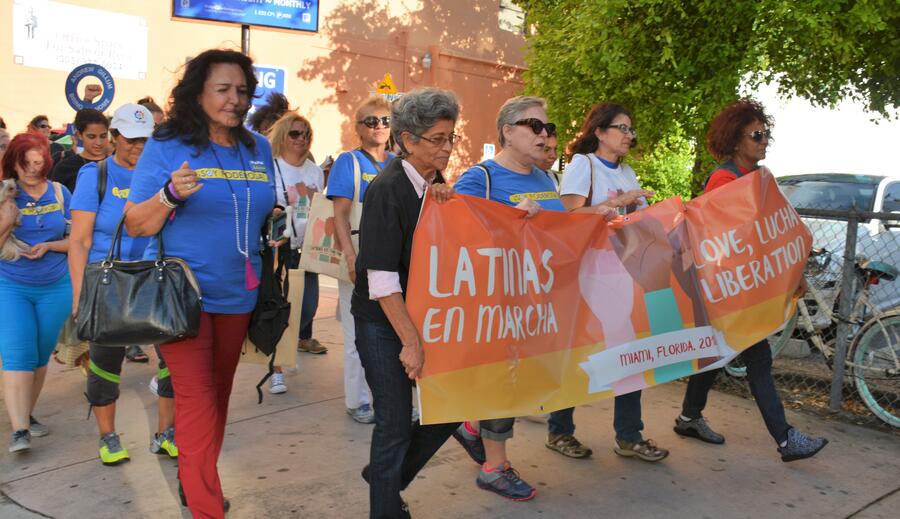All Floridians deserve to be safe and healthy. We deserve safe space to shelter, food in our bellies, the means to take care of our families, and the ability to seek care when we’re sick.
While access to these human rights and to democracy were by no means universal in Florida before the pandemic, the coronavirus has deepened these democratic deficiencies and exacerbated inequities in access to the resources and rights we need to lead full, healthy lives. This is especially true for Black and Brown communities in Florida.
Download the full report PDF
As the coronavirus pandemic was escalating, New Florida Majority Education Fund stopped all canvassing and pivoted a team of over 200 democracy organizers to doing wellness calls to people in the communities we serve. Between March and May 2020, New Florida Majority Education Fund democracy organizers called over 1 million Floridians and spoke with over 21,000 Floridians to ask them a set of questions about how the pandemic was affecting their lives and well-being. We have continued making calls to check in on Floridians and to provide resources and support to meet our community’s needs. To date, we have called approximately 1.4 million Floridians, speaking with and attempting to support more than 40,000 Floridians struggling to take care of their families and communities.
In our initial conversations as the pandemic was unfolding this spring, we found that, while Floridians of all races, ethnicities, and ages are struggling to feed our families, stay in our homes, find safe work, and access the supplies needed to keep ourselves and our communities safe, the harmful impacts of COVID-19 are hitting Black and Brown Floridians hardest. We also found that Floridians are civically engaged, filling out their census forms to ensure they are counted and making plans to vote by mail so their voices will be counted, too, this critical election year—but that the coronavirus is likely creating challenges in these areas as well.
This report presents our findings from those surveys conducted in the early days of the pandemic, from March through May, and paints a picture of the ways COVID-19 is impacting various communities in Florida.
Download the full report PDF to see the survey results
Key Findings
- Employment Status: People who self-identified as Black or Latinx shared experiences of layoffs and reduced work at higher rates than white respondents, across all age groups. Black respondents are being laid off at higher rates than any other racial or ethnic group surveyed, and those that have retained employment report to work in-person more than any other group surveyed.
- Housing Stability: Black and Latinx respondents reported not being able to pay rent at higher rates than white respondents—in the case of Latinx respondents, more than 4 times the rate of white respondents. Black and Latinx women, as well as Black and Latinx respondents whose gender is unknown or unreported, both reported higher rates of inability to pay rent than men.
- Food Security: Black and Brown respondents reported not having enough food to feed their families at nearly twice the rate of white respondents.
- Access to Cleaning Supplies: Black and Brown respondents reported not having access to cleaning supplies at more than twice the rate of white respondents. Latinx respondents reported not having enough cleaning supplies at a rate 14 percentage points lower than white respondents.
- Top Issues of Concern: Significant portions of both Black and Brown respondents and white respondents reported that health care and financial/job security were the top concerns as COVID-19 was unfolding. Respondents also reported being concerned about access to food, being able to pay their rent or mortgage, and their mental health, among other issues.
- Civic Engagement: Fewer Black and Latinx respondents have completed their census than white respondents, and Black respondents reported not having received their census form at rates 4-5 percentage points higher than white and Latinx respondents. Sixty-one percent of Floridians surveyed plan to vote by mail, but young voters plan to vote by mail at lower rates than older voters, and young Black and Brown voters report planning to vote by mail at the lowest rate of any racial or age group.
This survey was conducted in the earliest days of the coronavirus pandemic. Months later, Florida has emerged as a national hotspot of the virus. At the height of the pandemic in mid-July, Florida suffered a staggering 15,300 new cases per day and had lost more than 4,200 lives.
At the time of this writing, Floridians are suffering about 2,600 new cases daily and have lost a devastating more than 15,000 lives in our communities. Just as the day-to-day impacts of the coronavirus detailed in this report are hitting Black and Brown Floridians hardest, chronic disinvestment and systematic inequity means these same Floridians are also facing higher rates of infection and death.
Following the completion of this survey, research studies and news reports have showcased a continued widening of the racial disparities with COVID-19 and the harsh reality that Black and Brown communities are made to endure. As we face systemic inequalities, the harder times that Floridians are now facing call for immediate and holistic interventions, as detailed in the recommendations section of this report.
The Survey
Between March and May 2020, New Florida Majority Education Fund democracy organizers contacted more than 1 million Floridians and had in-depth conversations with more than 21,000 Floridians. On average, our organizers spoke with the Floridians we called for 15 minutes to ask a set of questions about the impact of COVID-19 on their livelihoods, including their needs and priorities, and their plans to be civically engaged this year through the census, voting, and volunteering. The more than 1 million Floridians we called represent New Florida Majority Education Fund members and supporters, as well as a sample of Floridians from the voter rolls who are not connected to the New Florida Majority Education Fund.
Download the full report PDF to read more


